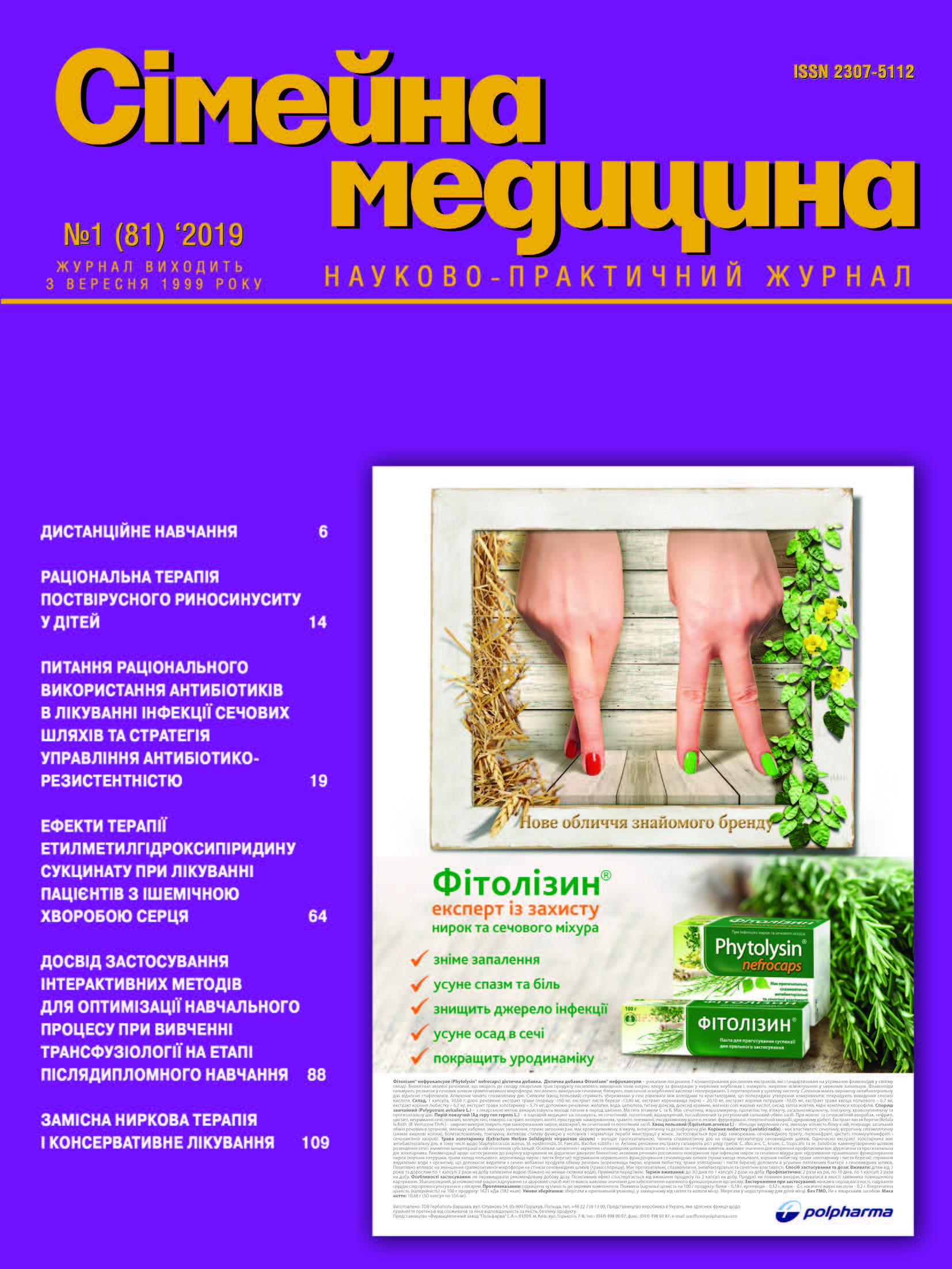Our Experience of Using Interactive Methods for Optimizing the Educational Process of Studying Transfusiology at the Stage of Postgraduate Education
##plugins.themes.bootstrap3.article.main##
Abstract
The main priority of modern medical postgraduate education is continuous improvement of teaching approaches to the training of doctors, making additions and changes to educational plans and programs meet the needs of health care. At the modern stage there is integration of higher education of Ukraine in European educational space. Ratified Law of Ukraine “About higher education” from 1.07.2014 envisages introduction of modern European innovation technologies of functioning of the system of higher education (principle of autonomy of higher educational establishments, combination of education with science, input own programs of educational, scientific and technical and innovative activity and other).
The objective: to conduct a systematic analysis of available literature sources for the study of the experience of using interactive methods for optimizing the educational process of studying transfusiology at the stage of postgraduate education.
Materials and methods. Trails were found on the Scopus, JAMA, Scolar, NCBI, Cochrane Library and PubMed databases for the 2008-2018 for keywords related to the experience of using interactive methods for optimizing the educational process of studying transfusiology at the stage of postgraduate education without regard to their design. The authors used the following methods: information-analytical, bibliosemantyc, systematic approach, structural and logical analysis and comparative content analysis.
Results. The article analyzes the quality level of organization and methodological basis of self learning, namely, among physicians of transfusiology at the department of hematology and transfusiology of Shupyk National Medical Academy of Post-Graduate Education (Kyiv, Ukraine) as an essential component of effective training of specialists. Interactive seminars allows combination of directive role of the teacher and high students’ activity using modern interactive technologies. Teaching the program material is carried out by enhancing students’ knowledge, both retrospective based on interdisciplinary connections and gained that are received by students during seminars and independent thinking. Efficiency of assimilating the material is a considerably enhanced by the introduction of multimedia technology, the advantage of which is simultaneous use of multiple channels of students’ perception, activation of the visual channel, the ability to create dynamic, visual-based learning materials, three-dimensional visualization of learning objects and more. The main criteria of efficiency of educational and psychological seminars are igniting students’ interest and motivation, expressing emotional responses through surprise, paradoxicality, feeling the example, cognitive need of further independent search, impetus for professional development of doctor under the influence of professional teacher. Physicians learn: to think critically, solve complex problems on the basis of an analysis of circumstances, participate in discussions. Interactive training excludes the dominance of one speaker and one opinion over the other. Interactive forms such as a round table, debates, business and role plays, and group discussions are used.
Conclusion. The use of interactive teaching methods in promising in postgraduate medical education, as it improved the general culture of communication and social behavior in general, encourages the specialist to constantly create, professional and personal growth.##plugins.themes.bootstrap3.article.details##

This work is licensed under a Creative Commons Attribution 4.0 International License.
Authors retain the copyright and grant the journal the first publication of original scientific articles under the Creative Commons Attribution 4.0 International License, which allows others to distribute work with acknowledgment of authorship and first publication in this journal.
References
Arinsburg S.A., Skerrett D.L., Fridman M.T. et al. (2012) A survey to assess transfusion medicine education needs for clinicians. Transfus. Med., vol. 22, no. 1, pp. 44–51. https://doi.org/10.1111/j.1365-3148.2011.01118.x
Berndt A., Murray C.M., Kennedy K. et al. (2017) Effectiveness of distance learning strategies for continuing professional development (CPD) for rural allied health practitioners: a systematic review. BMC Med. Educ., vol. 17, no. 1, pp. 117. https://doi.org/10.1186/s12909-017-0949-5
Eder A. F. (2016) Continuing medical education program in transfusion. Transfusion, vol. 56, no. 2, pp. 369. https://doi.org/10.1111/trf.13480
Karp J.K., Weston C.M., King K.E. (2011) Transfusion medicine in American undergraduate medical education. Transfusion, vol. 51, no. 11, pp. 2470–2479. https://doi.org/10.1111/j.1537-2995.2011.03154.x
Morgan S., Rioux-Masse B., Oancea C., Cohn C., Harmon J., Konia J., Konia M. (2015) Simulation-based education for transfusion medicine. Transfusion, vol. 55, no. 4, pp. 919–925. https://doi.org/10.1111/trf.12920
Panzer S., Engelbrecht S., Cole-Sinclair M.F. et al. (2013) Education in transfusion medicine for medical students and doctors. Vox Sang., vol. 104, pp. 250–272. https://doi.org/10.1111/j.1423-0410.2012.1661.x
Pyatnytskyi Yu. S., Oleksina N. O., Stetsyuk R. A., Melnyk I. V., Farion T.I. (2016) Nalezhne zabezpechennja vyshchoi osvity navchalnoju knygoju – nevid’jemna skladova zabezpechennja osvitnjoi dijal’nosti [Appropriate provision of higher education with text book – inseparable part of educational quality]. Medychna osvita/Medical education, no. 2(70), pp. 40–49. https://doi.org/10.11603/me.v0i2.6212
Strauss R.G. (2010) Transfusion medicine education in medical school: only the first of successive steps to improving patient care. Transfusion, vol. 50, no. 6, pp. 1632–1635. https://doi.org/10.1111/j.1537-2995.2010.02739.x





